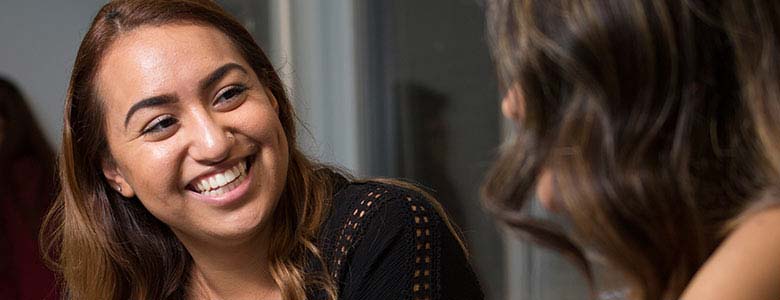Frequently Asked Questions
If you can’t find the answer to your question, please contact us and we will get back to you as soon as possible.
There are 4 differences:
- All students in the M.S. in Clinical Mental Health Counseling & Marriage and Family Therapy program progress through the curriculum at the same pace, two courses per semester. Students must take these classes spring, summer and fall semester for three years and one semester to complete the program. The traditional program offers more flexibility in scheduling courses; students can take two, three or four courses, depending on their life and work needs. The traditional program can be completed in three to five years.
- All courses in the M.S. in Clinical Mental Health Counseling & Marriage and Family Therapy program meet as follows. In the fall and spring semesters, classes meet from 7:00 p.m. to 9:45 p.m. on Mondays and Wednesdays. In summer, which runs from the beginning of June through mid-August, classes tend to meet from 6:00 p.m. to 10:00 p.m., plus two additional meetings to be arranged. Students in the traditional program must be available to take 4:00 p.m. and 7:00 p.m. courses in the fall and spring semesters in order to complete the program.
- M.S. in Clinical Mental Health Counseling & Marriage and Family Therapy students are guaranteed that they will be able to enroll each semester in the courses they need to take. Students in the traditional program do not have the same guarantee and may have to adjust their scheduling plans and graduation date when they are not able to get into courses that have reached their maximum enrollment.
- The M.S. in Clinical Mental Health Counseling & Marriage and Family Therapy program, because it is not state-supported, has somewhat higher tuition. Both programs have the same courses, taught by the same instructors. Students in both programs receive the same degree from California State University, Fullerton. Graduates of both programs will have met the educational requirements required by the California Board of Behavioral Science for LMFT’s and LPCC’s. Students in both programs have the same library privileges, and M.S. in Clinical Mental Health Counseling & Marriage and Family Therapy students are considered part of the CSUF community. They are welcome to use the library and other facilities and meet with faculty. Students in both programs will be advised by a full-time faculty member, who will help them with their study plans, and assist them with any other matter relevant to their graduate education with us.
In the fall and spring semesters, classes meet from 7:00 p.m. to 9:45 p.m. on Mondays and Wednesdays. In summer, which runs from the beginning of June through mid-August, classes tend to meet from 6:00 p.m. to 10:00 p.m., plus two additional meetings to be arranged. Class times are designed to meet the unit requirements set by the California State Board of Behavioral Sciences, which oversees LMFT and LPCC programs.
No. This program is a part-time program only. It is what is called a “cohort” program, meaning that all students go through the program together, taking the same two classes each semester. Our experience with this program and the traditional program has taught us that two classes per week are about the most a working student can successfully handle.
No. M.S. in Clinical Mental Health Counseling & Marriage and Family Therapy students can only take classes as part of this program.
In the midpoint of the program, all students are required to work in a community mental health agency for one to one and a half years. This fieldwork experience is called a “practicum” and is similar to the internship all students take after they graduate. In practicum, students will provide counseling to a variety of populations, including children, adults, couples, and families. The Department of Counseling has selected community agencies (“practicum sites”) that will fit with working students’ schedules. Practicum is a one to one and a half-year commitment, and is equivalent to a part-time job, requiring 15-20 hours per week at the agency. There is no salary or stipend, but it is an essential component of every counselor’s training. Students will also be taking two classes while participating in the practicum component; one of these classes will be a seminar in which students discuss their counseling experiences and show videotapes of their counseling sessions.
Most classes range from 25-35 students. Classes which require counseling training skills have about 13 students, and the Practicum seminar will have 8-10 students. Class sizes are identical to those in the traditional program.
Yes. Students who are denied can apply to the M.S. in Clinical Mental Health Counseling & Marriage and Family Therapy program, or, if they wish, apply to the traditional program the following year.
No. Currently, our plans are to start a new M.S. in Clinical Mental Health Counseling & Marriage and Family Therapy program every three years. We are planning to start a new cohort that will begin in Spring 2025. Applicants may apply for the Spring 2025 M.S. in Clinical Mental Health Counseling & Marriage and Family Therapy starting August 1, 2024.
For more detailed information regarding admissions to our program, please visit the admissions page on our website.
Please contact our Prospective Student Advisor, Angie Mello. She will be delighted to meet with you and answer any questions. You can email her at applycounseling@fullerton.edu or phone her at 657-278-5772.
In order to determine financial aid eligibility, students must first complete the Free Application for Federal Student Aid (FAFSA) for the academic year of attendance. If eligible, financial aid award is on based units taken and cost of attendance.











